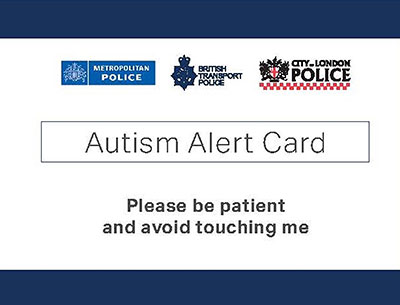Police say they are refocusing their efforts on better managing the autistic people their officers encounter.

The autism alert cards the Met Police hope will help them better manage the autistic people they encounter
The Met Police said it is “reinvigorating” the autism alert cards scheme launched across London in July 2019.
The cards include basic information, such as the person’s name and contact details for an appropriate adult if they come into contact with an officer.
They also provide information on autism and practical advice for the officer.
A booklet version of the card offers more information on how to help and communicate with the person.
‘Fantastic’
Commander Simon Messinger is the Met’s lead for neurodiversity.
He said the cards are a “fantastic way for autistic people to let the police know that they may need extra support and to help explain their feelings and reactions”.
‘Effective alternative to lanyards’
Venessa Bobb runs the autism community group A2ndvoice.
She set the group up to help autistic people from ethnic minorities and their families in South London.
Bobb’s 21-year-old son and 18-year-old daughter both have autism and she received a diagnosis for the condition in her 50s.
She hands out the autism alert cards when she attends shows and events.
Bobb believes they can be an effective alternative when young people do not want to wear lanyards.

Venessa Bobb believes autism alert cards can be a useful alternative when people do not want to wear lanyards
‘Not widely adopted outside London’
She maintains that when people with autism carry the cards, the police are better able to manage the encounter if they find it during a stop and search.
She said: “If they did get stopped, they (the police) would know automatically when they see it that the person is autistic.”
Bobb said the card is not operating universally because it has not been widely adopted by police outside London.
Tim Nicholls is the National Autistic Society’s assistant director of policy.
He said the cards should ensure officers treat autistic people “fairly, appropriately and with respect”.
Related:
Published: 5 October 2024















